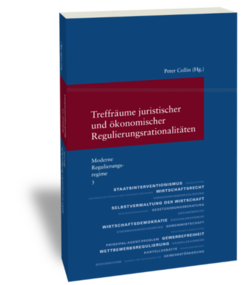Treffräume juristischer und ökonomischer Regulierungsrationalitäten
[Meeting Spaces of Juridical and Economic Regulatory Rationalities]
Edited by Peter Collin
Studien zur europäischen Rechtsgeschichte 286
Moderne Regulierungsregime 3
Frankfurt am Main: Klostermann 2014. VII, 235 p.
ISSN 1610-6040
ISBN 978-3-465-04210-5

Edited by Peter Collin
Studien zur europäischen Rechtsgeschichte 286
Moderne Regulierungsregime 3
Frankfurt am Main: Klostermann 2014
At the beginning of the 19th century, the state was more or less withdrawing from economic governance. At the same time, it curtailed the power of intermediary institutions, which were till that point individual sectors of economy that had been organized by and large as free of competition. In this sense one can speak of a deregulation of the market activities. The now emerging gaps were, however, not filled by free the contractual coordination of private legal subjects. Starting in the second half of the 19th century, the new forms of state economic governance were increasingly developed: in the organization of infrastructures, in reaction to the market failures, the balancing of social inequalities, the securing of basic provisions during times of war, in reaction to the financial crises, etc. In these fields of economic regulation, economic concepts and legal organizational conceptions came together in new ways.
The contributions to this volume investigate during the 19th and early 20th centuries, in which ways the juridical and economic regulatory rationalities interacted, in which organizational, personnel, thematic and disciplinary meeting spaces did they encounter one another, when did bridge building topics or bridging concepts stimulate communication, and which modes of interaction emerged, as well as where, i.e. in how far ignorance and speechlessness were prevalent.
